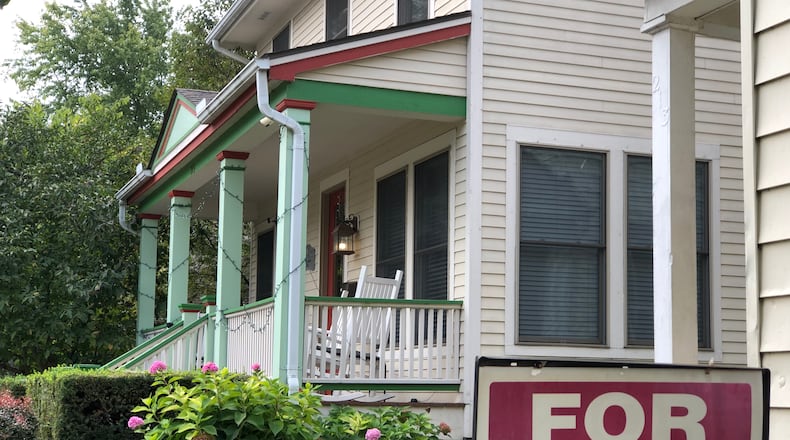“Eighty-six percent of voucher recipients in Montgomery County are Black, and the majority are single moms with kids,” said Emma Smales, a small business owner who recently was the birth outcomes manager for Public Health — Dayton & Montgomery County. “Housing Choice vouchers often are used as a proxy to discriminate against women with children and renters of color — this ordinance will put a stop to that.”
But some housing-providers, including multiple self-described “mom-and-pop” landlords, say the new “source of income” rules will do a lot more harm than good and they fear they will be forced to participate in the Section 8 housing program, which they claim is riddled with red-tape and other problems.
“If this legislation passes, you’re going to put a redline around the city of Dayton and you’re going to send a message to every investor outside of the city that the city of Dayton is closed for business, that if you come here it’s a high-risk environment,” said Greg Blatt, president of Dayton Realtors. “We fix this problem by having meaningful conversations about ... how to incentivize (people) to bring their capital here.”
But Dayton is far from the first to make this move. The city joins 21 states and 125 U.S. cities that have source of income protections, including 18 municipalities in Ohio, according to Debra Lavey, an attorney with Advocates for Basic Legal Equality, who cited data from the Poverty & Race Research Action Council.
Dayton’s new protections importantly will help people with Section 8 Housing Choice vouchers find housing, because right now far too often they strike out, she said.
Families often have to wait years to get Section 8 housing assistance, and when they finally obtain the vouchers, they have to use them quickly or lose them, Lavey said.
Without source of income protections, many of the nearly 490 local families with housing vouchers that currently are seeking housing would have a very hard time finding places to live, said Smales, the former birth outcomes manager.
The Section 8 program requires housing units to be inspected before tenants can move in and rent payments are made, and that can take a month or two to complete, depriving landlords of vital income, said Jeff Bowling, a Beavercreek resident.
Paul Amegatcher, a Brookville resident who owns rental properties in Dayton, said he thinks landlords are not accepting Section 8 vouchers because of problems with the program, and not due to discrimination.
Greater Dayton Premier Management (GDPM) “is notoriously difficult to work with, the program is disorganized and it is almost impossible to get a response from anybody within the organization,” he said. “Second, GDPM inspections are excessively stringent and focus on minor issues that self-paying tenants would not have issues with.”
GDPM is the local public housing authority.
Peter Julian, owner of Pathfinder Realty, said his company stopped accepting tenants with Section 8 housing vouchers because GDPM has issues with inconsistent housing inspections, delays in decision-making and poor communication.
“Once the housing authority has fixed its internal problems, I would definitely would be in support of the proposed ordinance,” said Julian, whose company manages about 900 rental properties, most of which are in Dayton.
Credit: Cornelius Frolik
Credit: Cornelius Frolik
Chrissie Pennington, a Huber Heights resident, said Dayton should incentivize participation in Section 8, instead of requiring landlords to accept vouchers, similar to a program in Wichita, Kansas, that pays landlords to accept tenants who receive housing subsidies.
“Whenever we have a program that takes months before you get your rent, like the HUD voucher program, you’re going to see a huge loss in mom-and-pops like me, because I can’t float that,” she said. “You are going to have fewer rentals for all people in the city of Dayton, and the only way that can be filled is probably by the larger corporations.”
Dayton City Commission members said the legislation does not mandate that housing providers must accept housing vouchers.
Housing providers who are unable to satisfy the minimum property standards of the U.S. Department of Housing and Urban Development (HUD) would not be in violation of the city ordinance if they denied a prospective tenant housing based on that reason, the commission said.
Dayton Commissioner Chris Shaw said he thinks GDPM can find some ways to streamline the inspection process to benefit both landlords and tenants.
Jennifer Heapy, CEO of GDPM, said the public housing authority has implemented a “fast-track” leasing process, and the payment process can begin a day after units are inspected and the proper documentation is provided.
GDPM last year started an incentive program for the emergency housing voucher program that provides monetary incentives for new landlords in the program as well as for units that pass housing quality standard inspections the first time, she said.
Heapy said she is willing to work with local groups to look at federal regulatory constraints and see if anything can be done about them.
About the Author

